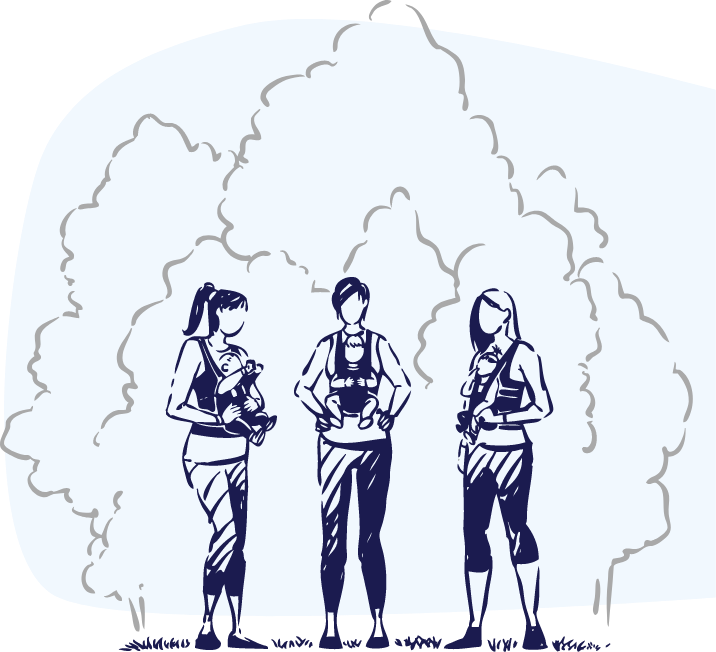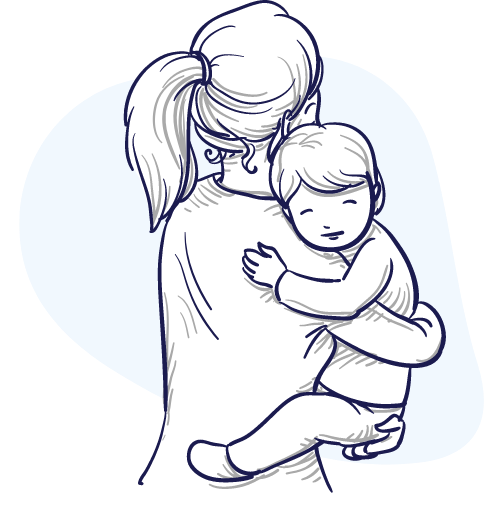Works instantly for my baby! Sigh of relief for both baby and me thank you
We take it with us everywhere. So good to have a back up if our little one is struggling.

Why it works for baby: If it’s warm enough, take your baby outside everyday and allow him to look around. Some parents even find that if they go outside with a crying baby the crying will suddenly stop as baby has something new to explore. Try to time your outings for first thing in the morning and afternoon. You don’t have to go far, either. It’s enough to walk around your yard, point out the leaves on the trees, and talk about the clouds.
Why it works for you: If you are having trouble sleeping at night, exposing yourself to a natural light and the great outdoor during the day can help to reboot you circadian rhythm. If you feel foggy during the day, try to aim for 30 minutes twice a day of outside activities, even if you just go sit in the backyard and talk to your baby about the scenery.Avoid Common Triggers:
Cruciferous Vegetables - These vegetables are known to cause gassiness, and include broccoli, cabbage, cauliflower, and onion.
Caffeine - When caffenine is passed to baby’s through breastfeeding in can lead to baby’s being overactive, fussy, colicky, wide-eyed, and develop problems sleeping.
Chocolate & Nuts - The sugar and caffine in chocolate is what keep babies up and nuts are one of the leading causes of allergens.
Dairy Products - Some babies have milk protein allergy in which they are allergic to cows milk while others can be lactose intolerant.
Why it works for baby: In about 70% of colicky babies, their crying begins after mealtimes. Knowing what irritates you baby and avoiding it, especially if you are breastfeeding can help everyone sleep a little better, If your baby is formula fed, talk to your pediatrician about changing to a different formula. If you are breastfeeding avoid common triggers such as cruciferous vegetables, caffine, chocolate, and dairy products. Remember our baby’s digestive tract is still developing, and maybe not be able to handle certain foods or groups of foods yet.
Why it works for you: Eliminating potential gut irritants from your diet may help you feel better and focus easier, not to mention reducing strain on you baby’s still developing digestive tract may help your baby to be more comfortable if your diet is causing some of the syptoms of colic symptoms.
When to use this tip: This is perhaps one of the fastest and easiest ways to help eliminate unnecessary crying. It takes out bodies a while to eliminate what we eat (especially if you’re breastfeeding), so this isn’t an overnight fix, but eliminating potential triggers sooner rather than later can mean less crying.
3. Try this: Eliminate/reduce screen time
Why it works for baby: In about 70% of colicky babies, their crying begins after mealtimes. Knowing what irritates you baby and avoiding it, especially if you are breastfeeding can help everyone sleep a little better, If your baby is formula fed, talk to your pediatriician about changing to a different formula. If you are breastfeeding avoid common triggers such as cruciferous vegetables, caffine, chocolate, and dairy products. Remember our baby’s digestive tract is still developing, and maybe not be able to handle certain foods or groups of foods yet.
Why it works for you: Eliminating potential gut irritants from your diet may help you feel better and focus easier, not to mention reducing strain on you baby’s still developing digestive tract may help your baby to be more comfortable if your diet is causing some of the colic symptoms.
When to use this tip: This is perhaps one of the fastest and easiest ways to help eliminate unnecessary crying. It takes out bodies a while to eliminate what we eat (especially if you’re breastfeeding), so this isn’t an overnight fix, but eliminating potential triggers sooner rather than later can mean less crying.
Pineal Gland: The pineal gland produces melatonin which is a hormone that modulates your sleep.

4. Use blackout shades or blue light eliminators
Why it works for baby: Some people find that they sleep better in complete silence, with no light. If you are tired at bedtime but have difficulty falling asleep, try installing room darkening shades to see if that improves your sleep habits. If you are up during the night, make sure that the overhead and ambient light is devoid of blue light, which can actually wake up your brain and cause sleep disruptions. The Good Night Light is a great option for this and will help you get back to sleep sooner if you do get up to be with your baby.
Why it works for you: Just like screens, light, especially blue light interferes with your body’s ability to produce melatonin. Try replacing any lights in the rooms where you spend your evenings with blue light eliminating bulbs.
When to use this tip: When you finally get your baby to sleep, the last thing you want is for them to pop awake because the sun shifts or the light bothers them. Make sure that your baby’s sleep environment is sleep-inducing.

5. Try This: Carry Your Baby
Why it works for baby: While you’re up and about during the day, putting your baby in a safe wrap or structured carrier is a great way to bond with your new baby, and help to ease her pain. Remember, many babies who suffer from colic do not like to be laid flat, so keeping your baby close to you and upright is very soothing.
Why it works for you: Carrying your baby allows you to be close and bond, while soothing your baby and keeping them upright, which may help to calm colic.
When to use this tip: Carriers are wonderful for naps, and can help to keep your baby upright, which is a bonus if laying flat exacerbates your baby’s colic symptoms.
4.98 / 5.0
(3546) 3546 total reviews
4.78 / 5.0
(50) 50 total reviews
4.53 / 5.0
(113) 113 total reviews
Subscribe to our mailing list to stay in the loop on exclusive promotions, new product launches, and expert parenting tips - delivered straight to your inbox every month!

Colic Calm's unique formula targets colic-related issues and provides fast-acting relief for babies.
Receive updates on new product releases, exclusive offers and more.
2025 Colic Calm. All Rights Reserved.
* These statements have not been evaluated by the Food and Drug Administration. This product is not intended to diagnose, treat, cure or prevent any disease. ** The information on this website is presented for educational purposes only and is not medical advice. Always consult a doctor with any questions regarding your child’s health concerns. *** Unless otherwise indicated, the individuals depicted on this site are models used for illustrative purposes only.
Works instantly for my baby! Sigh of relief for both baby and me thank you
We take it with us everywhere. So good to have a back up if our little one is struggling.
Your product is a wonderful thank you very much
Your product is a wonderful thank you very much
Your product is a wonderful thank you very much
